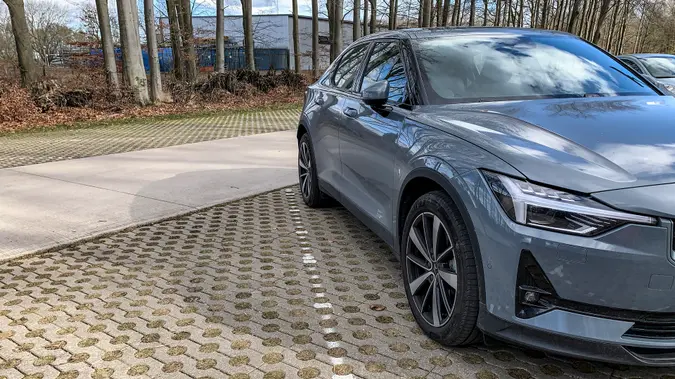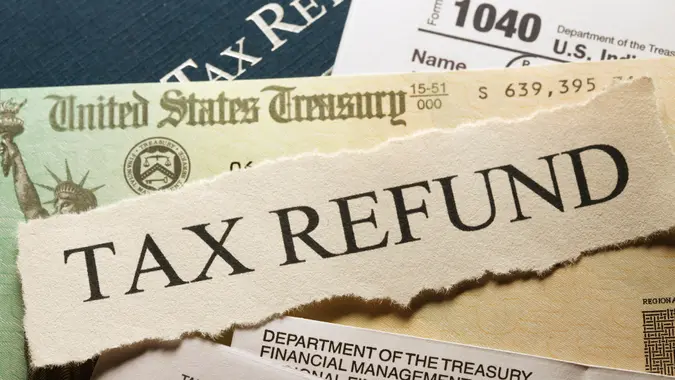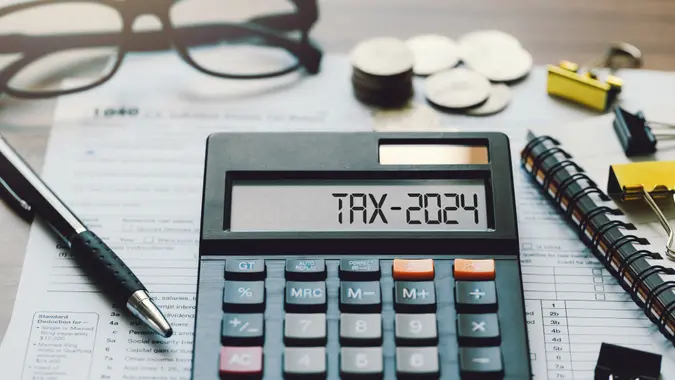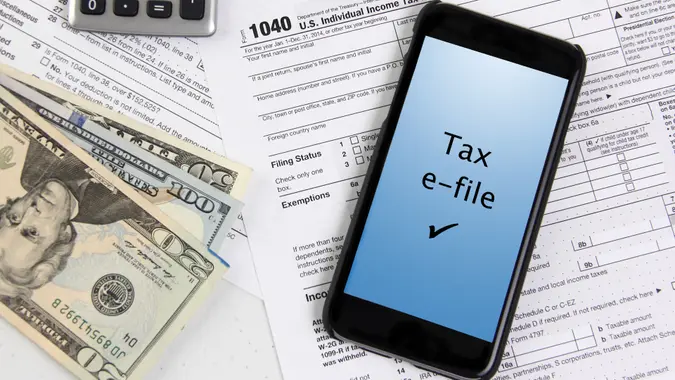2024 EV Tax Credit: Does Your Electric Vehicle Purchase Qualify?

Commitment to Our Readers
GOBankingRates' editorial team is committed to bringing you unbiased reviews and information. We use data-driven methodologies to evaluate financial products and services - our reviews and ratings are not influenced by advertisers. You can read more about our editorial guidelines and our products and services review methodology.

20 Years
Helping You Live Richer

Reviewed
by Experts

Trusted by
Millions of Readers
Understanding federal tax credits is not an easy feat, especially when it comes to ever-evolving laws around tax credits for electric cars. If you own an electric vehicle, or EV, or of thinking of buying one in 2024 there may be an additional bonus you didn’t factor in. It’s called the EV tax credit or electric vehicle tax credit, but how can you find out if you qualify?
Read: What To Do if You Owe Back Taxes to the IRS
What Is the EV or Electric Car Tax Credit?
The EV tax credit is a benefit offered by the government to encourage people to buy electric vehicles. You might think of like a discount that you can get when you file your taxes. This tax credit can help make electric cars more affordable. Here are some key takeaways:
- It would be available to you under the clean vehicle tax credit umbrella offered to you as a taxpayer if you’ve purchased a qualifying electric vehicle or plug-in hybrid vehicle.
- The Inflation Reduction Act of 2022 amended the Qualified Plug-in Electric Drive Motor Vehicle Credit, now known as the Clean Vehicle Credit which took effect after Aug. 16, 2022, and applies to vehicles placed in service on or after Jan. 1, 2023.
- The IRS regulated the EV tax credit beginning on Jan. 1, 2024, which states that clean vehicle tax credits must be initiated and approved at the time of purchase.
- The amount of the credit will depend on whether the vehicle meets new critical minerals and battery components requirements for vehicles placed in service after Apr. 17, 2023.
- New electric vehicles can qualify for a partial credit of $3,750 or the full $7,500 credit.
- There’s also a chance to get $4,000 for a used EV tax credit, or other qualifying vehicles purchased in 2023.
- These tax credits are nonrefundable and can lower your tax liability, or what you owe in taxes, however, you won’t get refunded for any excess credit amount.
- In 2024, you can opt to either claim the IRS energy credit online on your federal returns or transfer the credit to an eligible dealership, which could lower the cost of your vehicle.
- Your modified adjusted gross income, or AGI, must fall beneath certain thresholds, and the vehicle you plan to purchase must also meet several IRS specifications, including price caps, battery capacity, gross vehicle weight rating and manufacturing guidelines.
The EV Tax Credit: How Much You Get and How To Claim It
The amount of the tax credit can vary depending on different factors. Generally, you can either get a partial credit of $3,750 for a new electric vehicle purchase, the full $7,500 credit, a $4,000 for a used EV tax credit, or other qualifying vehicles you’ve purchased.
It’s a one-time credit, meaning you can only get it when you buy a new electric car. Claiming the EV tax credit is usually straightforward. When you file your taxes, you’ll need to fill out Form 8936, the Qualified Plug-in Electric Drive Motor Vehicle Credit and provide proof that you bought an eligible electric vehicle with a sales receipt or a document from the car dealership.
Recently, due to a rule change last year, you can now either apply for the full $7,500 credit when you file for taxes or apply it as a discount at participating car dealerships. This is a great option to have a chunk taken off at the point of sale if you’re in the market to buy and want to save on some tax paperwork.
Does Your Car Qualify for the EV Tax Credit?
Whether or not you qualify for the EV tax credit will depend on several factors, including the vehicle’s MSRP, its final assembly location, battery component and critical minerals sourcing, and your modified adjusted gross income. Not everyone who buys an electric car can get the tax credit. There are certain requirements you need to meet. Here are some key points:
- Make and model: Only certain electric vehicles qualify for the tax credit. Not all electric cars are eligible. You need to check if the make and model of the EV you’re interested in are on the approved list.
- Battery capacity: The size of the EV’s battery also matters. Generally, the bigger the battery, the larger the tax credit you can get.
- Income limits: Some people may not qualify for the full tax credit if their income is too high. There’s usually an income limit set by the government.
- New purchase: The tax credit is only available for new electric car purchases, not used ones. However, some Pre-owned vehicles purchased in 2023 or after are eligible for a tax credit of up to $4,000.
Qualifying EVs
| EV Make and Model | Eligible Tax Credit Amount |
|---|---|
| 2022 or 2023 Chevrolet, Bolt EV | $7,500 |
| 2022, 2023 or 2024 Ford, F-150 Lightning | $7,500 |
| 2023 or 2024 Rivian, R1S or R1T Dual Large | $3,750 |
| 2023 or 2024 Tesla, Model 3 Performance | $7,500 |
| 2023 or 2024 Tesla, Model X Long Range | $7,500 |
| 2023 or 2024 Tesla, Model Y All-Wheel Drive | $7,500 |
| 2023 or 2024 Tesla, Model Y Performance | $7,500 |
| 2024 Tesla, Model Y Rear-Wheel Drive | $7,500 |
| 2023 or 2024 Volkswagen, ID.4 AWD Pro, Pro S, Pro S Plus | $7,500 |
| 2023 or 2024 ID.4 Pro, Pro S, Pro S Plus | $7,500 |
Final Take To GO
If you’re thinking about buying an electric vehicle in 2024, be sure to look into the EV tax credit. It could help you save money on your purchase, especially if you might be in a higher tax bracket and have larger tax liability. Just remember to check if the car you want qualifies for the credit, and make sure you meet all the requirements. With the right information, you can take advantage of this benefit and enjoy the perks of driving an electric car while saving some cash.
FAQ
- Is there an EV tax credit for 2024?
- Yes, there is a 2024 EV tax credit you can claim. The full tax credit is $7,500 or you may be eligible for a partial tax credit of $3,750. The amount you'll get will vary depending on factors such as your vehicle's MSRP, its final assembly location, battery component and critical minerals sourcing, and your modified adjusted gross income.
- What tax credits are available for a Tesla Y in 2024?
- A 2024 Model Y Rear-Wheel Drive is eligible for the full $7,500 tax credit as is the Model Y Long Range.
- How do I claim the $7,500 EV tax credit?
- There are two ways you can claim the $7,500 EV tax credit which include doing so when you file your taxes or taking it as a discount off your car purchase at participating dealerships. You'll need to fill out a form and provide proof that you bought an eligible electric vehicle with a sales receipt or a document from the car dealership.
Our in-house research team and on-site financial experts work together to create content that’s accurate, impartial, and up to date. We fact-check every single statistic, quote and fact using trusted primary resources to make sure the information we provide is correct. You can learn more about GOBankingRates’ processes and standards in our editorial policy.
- CNET. 2024. "The 2024 EV Tax Credit: Big Rebate, Small List."
- U.S. Dept. of Energy. "Federal Tax Credits for Plug-in Electric and Fuel Cell Electric Vehicles Purchased in 2023 or After."
- U.S. Dept. of Energy. "Electric Vehicle (EV) and Fuel Cell Electric Vehicle (FCEV) Tax Credit."
 Written by
Written by  Edited by
Edited by 

























